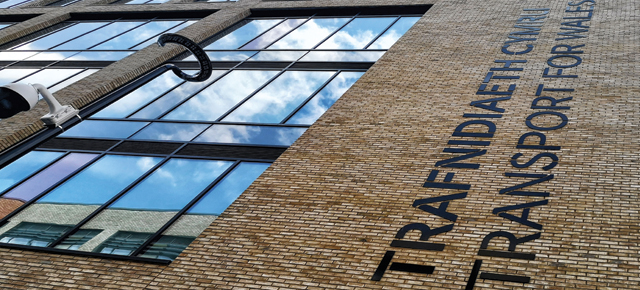Initially set up to procure the Wales and Borders rail franchise, Transport for Wales will be tasked with nurturing a ‘multi-modal culture in Wales’
TfW headquarters in Pontypridd
Transport for Wales has a new remit which will eventually include procuring and managing bus services.
TfW’s future bus role is set out in a letter, published this month, from Lee Waters, deputy minister for climate change, to Scott Waddington, chair of TfW. Waters says TfW will be “required to embed a multi-modal mindset” and nurture a “multi-modal culture in Wales across the public, private and third sectors through its staff, procurement and engagements with partners”.
Pontypridd-based TfW was initially set up to procure the Wales and Borders rail franchise. The government has already given it additional responsibilities, with more likely to follow. TfW’s new remit, termed TfW 2.0, requires TfW to “maximise modal shift” while reducing the costs of running public transport networks; to deliver a fully integrated transport system in close partnership with local and central government; to encourage and support people to adopt sustainable transport modes as their default; and enhance and develop greater commercial opportunities to maximise revenue, minimise costs, mitigate risks and exploit opportunities.
Roles and responsibilities across the bus system are currently fragmented, with no overall guiding mind, leading to a lack of consistency and standardisation
Explaining TfW’s new bus remit, Waters wrote: “Roles and responsibilities across the bus system are currently fragmented, with no overall guiding mind, leading to a lack of consistency and standardisation.
“The Welsh Government, through the Bus Bill, is proposing to hold the statutory responsibility for bus services in Wales.”
Waters acknowledged that bus operators and their staff are “crucial to the effective delivery of services to meet people’s needs”. Key stakeholders together would offer a guiding mind for the overall system.
“Local authorities will retain key responsibilities, including local intelligence and insight, local infrastructure and school transport while Transport for Wales, with ministers’ agreement, will bring together these partners and provide technical advice to allow them to set a joint strategic direction for bus services in Wales.”
If the final version of the Bill is agreed in the Senedd, TfW will:
lead on development and delivery of the system as a whole;
work with local and regional representatives to develop and dynamically manage bus networks and priorities, “recognising the significance and importance of local bus expertise, knowledge and relationships” and local authorities’ ongoing role in the transport system;
be accountable for services and how they will run, including routes, vehicle standards, timetables, fares, branding, passenger information and ticketing;
provide direction and consistency across Wales;
procure and manage bus services;
distribute funding to operators and manage revenue risk on behalf of Welsh Government within an agreed fiscal envelope.
Waters added: “In order to facilitate this, both the Welsh Government and local government will need to develop appropriate mechanisms to hold TfW to account in its role in delivering the bus franchising programme on behalf of our democratically-accountable public authorities.”
Bev Fowles, vice-chair of the Coach and Bus Association Cymru, said he had no idea how TfW would discharge its remit of managing bus services. “The best people to manage bus services are the bus operators in conjunction with the local authorities. The [service] registration is a local registration and therefore the people locally know best, not some people in the cathedral.
We don’t even know who is in the cathedral in Pontypridd. We don’t know what regions people come from to take the positions there. How is a guy in Pontypridd going to know what the people of Machynlleth [in rural Powys] need?
“We don’t even know who is in the cathedral in Pontypridd. We don’t know what regions people come from to take the positions there. How is a guy in Pontypridd going to know what the people of Machynlleth [in rural Powys] need?”
The government could point to the required input from local and regional representative in answer to that. However, Fowles said local government had lost many of the transport officers who understood local areas and networks, and other experienced officers were close to retirement. Some expertise has gone from local authorities to TfW, including former Caerphilly officer Huw Morgan who is now TfW’s head of integrated transport.
This article appears inside the latest issue of Passenger Transport.
DON’T MISS OUT – GET YOUR COPY! – click here to subscribe!
The post ‘TfW 2.0’ will manage bus services in Wales first appeared on Passenger Transport.

